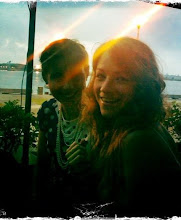Now, being a Sci-Fi nerd, the name automatically grabbed me. I envisioned teachers and students running around with suped-up mobile devices participating in geek-a-thon cosplay. The reality was, of course, much more practical than this (though I'll never give up hope of running a live-action role-playing game to teach kids about history).
Anyway - Ben's session involved a bunch of educators running around with iPhones, scanning QR codes and completing small tasks. None of us had done anything like it before, but once we familiarised ourselves with the technology it was smooth sailing. It was an awesome way to introduce us to the idea.
Long story short, I came back inspired. I ran a session for my own school at one of our staff meetings. And now the principal has asked me to create a GeoQuest for the Year 6 kids on their transition day. What an awesome way to introduce kids to their new environment and teachers, as well as getting them working in teams with other kids at the school.
I haven't made the transition day quest yet, but when I do, I'll post it. For now, here is the one I did with our staff.
This is the QR from the library door (it's a link to a personalised Google Map):
At each station, teachers scanned more QR codes with instructions for activities to perform. I won't put them all up here, as there are plenty. If you're interested in what kinds of activities you can do, give me a buzz.
Posterous is a blogging tool that allows you to allocate groups and monitor their activity. This way, each time a group sumits an 'assignment' to their posterous blog (via e-mail on their mobile devices), it is automatically categorised into their own rolling record of work. You can keep an eye on times of submission, and all of your groups are stored within your own Posterous account. Very cool.
If you want to see more of Ben Jones' great ideas, head over to: http://benpaddlejones.edublogs.org/
Anyway, happy questing!








